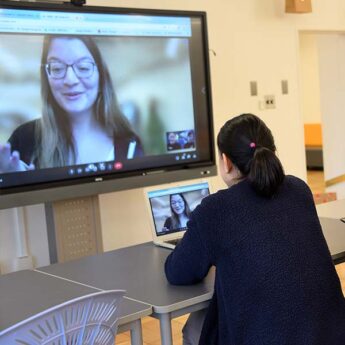Interview with Brian Christian
It has been an exciting period for the BST. This year, teachers, students and parents have come together to mark the international school’s 25th anniversary, while in 2013 it was awarded the BCCJ’s British Business Award for Global Talent.
As principal, Brian Christian has exciting ideas up his sleeve to build on the successes of the school going forward.
How are you building on the accolade of the award?
Nurturing global talent is a primary aim for any good school, particularly an international one. At BST we work hard to develop a confident, caring and outward-looking mindset in our students.
This year we are seeking to articulate more clearly the values and attitudes we hold most dear. Although these are far from being exclusively from the UK, we have developed a campaign using the acronym BRITISH, showing the values are central to the aspirations of the school.
What can the BST offer that other institutions cannot?
As the only institution in Japan offering British A Level qualifications, and closely adhering to the central tenets of the national curriculum for England—including a programme of rigorous assessment—the school has an unparalleled position.
The vast majority of our teachers are trained in the UK, or have significant teaching experience there.
This year, as a member of the Council of British International Schools, we will enable a young, recently qualified teacher to complete their statutory induction year overseas, and two of our teaching assistants have successfully completed their international postgraduate teaching certificate with us.
In broader terms, the school is the hub of an extensive network. With students representing almost 60 nationalities, our inclusive community embraces people who have different backgrounds and experiences.
What has contributed to the success of the school?
Outstanding schools are built on the efforts and talents of outstanding people— particularly teachers—and the careful recruitment of top practitioners is the key to the school’s continued success.
Our head teachers aim to see every shortlisted applicant teaching in their school before a final interview is conducted. As we tend to recruit almost entirely from the UK, this is a very expensive process—both financially and in terms of time—but it pays dividends.
Other important factors have been the ongoing support of our community of parents and friends, and of the British business network in Tokyo—exemplified by our relationship with the British Chamber of Commerce in Japan.
We also remember the role played by our hosts, sponsors and partners, including initial supporter Tokyo’s Shibuya Kyoiku Gakuen. Our association with Showa Women’s University in the capital has given us access to facilities we could never have envisaged 25 years ago.
How have students and teachers been involved in the anniversary?
In all sorts of ways, and it’s not over yet. The first specific occasion was the celebration hosted at the British Embassy Tokyo in March.
An opportunity for the BST to highlight the influence of British business in Japan, teachers and students showcased their talents before a distinguished audience. Our budding engineers even seized the opportunity to launch some powerful rockets from the ambassador’s lawn.
The academic year came to an end with the most ambitious venture of the anniversary celebrations so far—a 540km relay race from Kyoto to Tokyo along the historic Nakasendo Way.
Some 16 teenage students, accompanied by teachers and parents and guided by Walk Japan Ltd., successfully completed this Edo period journey over five days.
What are your hopes for the future?
Over the past six months the BST has published an outline of its strategy to take us towards 2020 and the next chapter in our history.
I hope that we will continue to grow; in September 2012 we had 685 students, and today we have 865. That increase bears testament to the burgeoning reputation of the school. Our major aims in the future are to open up more space within central Tokyo, and develop our facilities.
Above all, I hope that we can continue to attract the best teachers and maintain our close-knit sense of community. We want every one of our students to be given the best possible opportunity to be all that they can be.





